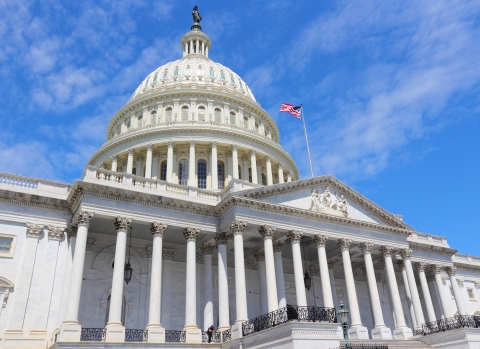Newly Revived Pandemic Risk Insurance Act Gains Overwhelming Industry Support

The event and hospitality industries are rallying behind a new bill that would help restore communicable disease coverage within event cancellation insurance and keep jobs and businesses protected during future pandemics and public health emergencies. Reintroduced in Congress on Nov. 2 by U.S. Rep. Carolyn B. Maloney (D-NY), the Pandemic Risk Insurance Act of 2021 (PRIA), a version of which she first proposed in May 2020 in response to the COVID-19 pandemic, is music to the ears of those in industries still reeling from billions in pandemic-related financial losses.
If passed, the bill would require insurance companies to offer business interruption and event cancellation policies that cover pandemics as well as create a Pandemic Risk Reinsurance Program to ensure that there is sufficient capacity to cover the losses and protect the economy in the event of a resurgence of COVID-19 or future pandemics. Under the bill, the federal government would serve as a backstop to maintain marketplace stability and to share the burden alongside private industry.
In a letter of support to Maloney, David Audrain and David DuBois, co-presidents of the Exhibitions and Conferences Alliance (ECA), a coalition dedicated to the recovery and advancement of face-to-face business events, outlined the toll the pandemic has taken and the impact the bill could have on the industry and the economy overall.
“Prior to the pandemic, our industry contributed $396 billion annually to U.S. gross domestic product and supported 6.6 million jobs, including $22.1 billion in economic impact,” they said. “Unfortunately, our industry continues to be devastated by the ongoing COVID-19 pandemic.”
Audrain and DuBois pointed to recent research, which found that as of June 30, 2021, the business-to-business events sector was still down 78.5% from pre-pandemic levels, adding that one critical factor slowing the return of face-to-face business events is the inability for the community to obtain communicable disease coverage for future pandemics as part of their event cancellation insurance.
“With expenses for business events starting to accrue one year or more in advance, many organizers are financially unable to take on the risk of putting on uninsurable events,” they said. “This disruption in the insurance market is significantly limiting our industry’s ability to bring back events and jobs, which impedes both our industry’s recovery and our ability to support the small businesses who rely on our events to nurture, cultivate and grow their businesses.”
Audrain and DuBois added that the PRIA legislation would help remedy the current collapse in the event cancellation insurance market by establishing a public-private backstop that ensures the industry, and the U.S. economy more broadly, is properly protected against pandemic-related risk going forward.
“PRIA will help us bring back jobs, jumpstart our industry’s recovery and support countless small businesses and non-profit organizations as they bounce back from the devastation of COVID-19,” they said.
The American Society of Association Executives (ASAE), which has called for a pandemic risk insurance solution since March 2020, was also quick to offer support for PRIA.
“PRIA’s coverage for event cancellation is especially critical to our association community, whose lifeblood courses from in-person events of all sizes and scope,” said ASAE President and CEO Michelle Mason. “ASAE thanks and applauds Rep. Maloney for introducing this important bill, which will no doubt help provide associations with the security they need to fully reignite our community’s far-reaching economic impact through industry-focused conferences and events, among other crucial services.”
Maloney thanked ASAE for its support of PRIA and for working with her to move the important solution forward.
“Millions of small businesses, nonprofits, associations and event companies across the country were left in the cold during the coronavirus pandemic through no fault of their own,” Maloney said. “A public-private framework would ensure our insurance markets serve these businesses in the next pandemic, and I am proud to sponsor the Pandemic Risk Insurance Act to provide these important protections.”
Other officials throughout the event and hospitality sectors also applauded Maloney and endorsed the proposed PRIA legislation, urging bipartisan support for the bill.
“The Pandemic Risk Insurance Act of 2021 … will ensure our industry’s ability to organize events in the future,” said Hervé Sedky, board chair of ECA and president and CEO of Emerald. “This would help us bring back jobs, accelerate our road to recovery and support the countless small businesses who rely on face-to-face business events going forward.”
Also endorsing the bill is the U.S. Travel Association, which recently gathered in Washington, D.C., with a broad alliance of industry representatives under its Let's Meet There initiative to call for the full return of business travel and events.
“It’s clear that without significant reforms to the business interruption and event cancellation insurance markets, travel businesses will not be able to get the type of coverage they need to reduce economic uncertainty and build a stable path to recovery,” said Tori Barnes, U.S. Travel’s executive vice president of public affairs and policy. “The sooner we stabilize the market for pandemic risk insurance, the sooner travel businesses can get back to business.”
Meanwhile, Chip Rogers, president and CEO of the American Hotel and Lodging Association, said the legislation would help ensure that America’s hard-hit travel industry has a critical safety net in the event of a future pandemic.
“Had this bill been law before COVID-19, hotel owners could have purchased affordable insurance that would have helped keep thousands of workers employed and offset the billions in economic losses hotels have experienced since,” he said. “COVID-19 is the worst economic event in the history of the American lodging industry, and this bill would provide crucial protection for hotel employees and small business owners if our nation ever faces another pandemic.”
Don’t miss any event-related news: Sign up for our weekly e-newsletter HERE and engage with us on Twitter, Facebook and LinkedIn!


Add new comment